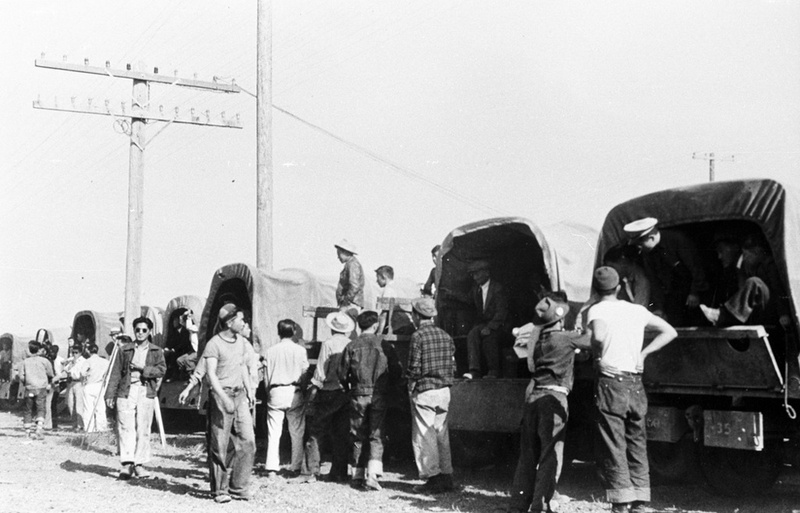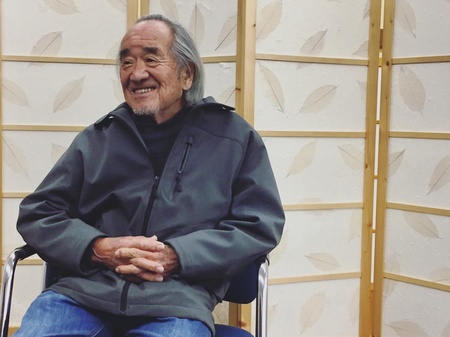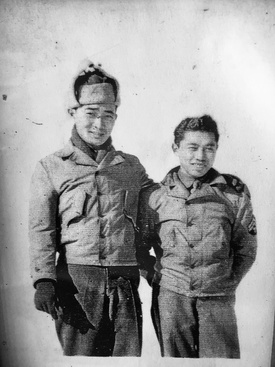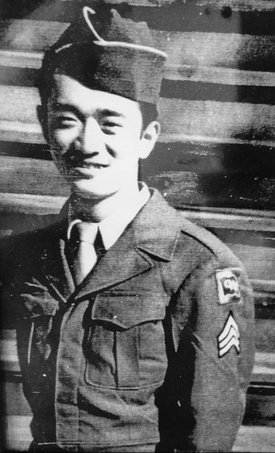When I got married and had a family, that’s when it sort of hit me, what my parents went through. And they never let on that they were panicking because of what was happening to the Japanese people. They were very stoic, strong people.
— Robert Tanaka
Robert has the kind of serene, light-hearted personality that draws you in. With a touch of dry humor, he’s able to tap into deep emotions that periodically surface through tears and a shaky voice. When he recalls the silent strength of his parents, or the kind music teacher in camp who altered the course of Robert’s life, he’s overwhelmed with gratitude. At 92 years young, his grounded sense for what really matters in life illuminates his wartime memories.
Robert was part of the Military Intelligence Service that was stationed in Japan after the surrender. But he nearly answered no/no on the divisive loyalty questionnaire, going along with his group of teenage friends. But a white teacher inside camp, who was a conscientious objector himself and refused the draft, urged Robert to reconsider the weight of this decision. “Bob, I wish you’d go home and think about what you’re doing,” is all he said. In an paradoxical twist of fate, Robert was called to serve in the military.
He recalls that he always understood acts of injustice, identifying with the struggles of the Black workers in Cleveland with whom he came into contact. “You have to be a minority to realize how unequal equality is. That was a lesson I learned when I got into the big world,” he says.
Can you share some of your memories before World War II?
First of all let me just introduce myself in that, I’m 92 years old. And I was born on August 16th, 1924.
But ten years before the war, there were five boys. My mother and father divorced and I ended up with my two youngest brothers. The other two boys stayed with the father. And we ended up in Watsonville, California. And I went to high school there and I was in my junior year when Pearl Harbor took place. And so, we kind of lived with that for a few months. I remember my U.S. History teacher, he would sort of sit on top of his desk and he’d say, “Well, Japan and the U.S. are not at war. It’s ridiculous for the Japanese country to think they can come and occupy and win the war when they’re 5,000 miles away.” He said this war isn’t going to last too long. So we sort of went with that. But he also told the rest of the students–there were maybe five or six of us in a class of 25–he said, “Now these are our classmates, our friends. So let’s not look at them as the enemy in any way at all. And I remember that conversation he gave to the class that day and I think that kind of helped us get over this anxiety of what was going to happen to us.
But as time went on, we had this General DeWitt (I’d like to call him dimwit), he was basically in charge of supplies and things like that and he didn’t have anything important to do so he came up with this idea that hey, we have to get rid of all these Japanese and people of Japanese ancestry and get them off the West Coast because if there’s an invasion, we don’t want them helping them out at all. And a lot of this sort of talk didn’t make any sense to me at all. The Niseis, the 120,000 that were lifted from the West Coast, we had to move either across a certain demarcation line in the center of California all the way up to Washington. And my stepfather said, “I have some friends in Davis. Let’s move over there so we don’t have to move again.” Well of course that didn’t happen. Turned out that six months later, they came out with a new proclamation and this was Executive Order 9066. And they said they’d have to move practically out of California, so many miles in. So that means, a 120,000 of us were given about two, three weeks notice. Now, for my family, we didn’t have a business. We worked as laborers. But those people who had buildings and apartment buildings and businesses, I think they just lost everything. Two weeks what can you do? You sell it for 10 cents on the dollar? If you got that much you were lucky. A lot of people came to look at the left behind equipment who came to look at it, thought that if they wait long enough they can get it for nothing which is what happened.
So your parents were farmworkers?
My father worked for a friend, and drove a tractor. My mother worked in the cannery. I think this split the family. She said I got to get away from this. We ended up in Watsonville and it was wonderful. You got to know the town. I still remember this one person, Walter Daley and we really palled around together. And you wanted to assimilate with the community. I think we excelled academically and even sports.
So being in Davis, I ended up in Tule Lake. We were one of the first to go into Tule Lake. So I ended up in Block 415 C. 4 being block four, 15 being the barrack number, C being the apartment number. And each barrack was divided up into four units. So when we got there, we were already assigned our family number which was 37315. And so we had tags on us hanging around our neck and we had tags on our suitcases.
You know, it’s kind of a funny thing, I’m going to jump some years here. When I got married, and had a family, and I guess my children were about 9, 10, high school age. That’s when it sort of hit me, what my parents went through, the Isseis. And they never let on that they were panicking because of what was happening to the Japanese people. They were very stoic, strong people. And so we never really worried about anything. When my children were at that particular age, that’s when the whole thing hit me all of a sudden, what our parents must have gone through and yet they didn’t want to alarm the children of the family.
But I remember this one incident about my mother. She sewed a little cloth pouch. And she put in a couple of handfuls of uncooked rice with the drawstring. And she told the two of us, “Wear this around your neck all the time in case you ever get into a position where there’s nothing to eat and you’re starving, just take a couple finger-fulls of rice and leave it in your mouth, and the moisture from the saliva will soften it up a little.”
That was in camp?
No, this was before we left home. They didn’t break down or anything. Very, very strong people. Actually all the Isseis are all like that because when they came over from the old country, they came with nothing, and they worked hard. They worked hard all their life for their family. But when you become a parent, you start to see, feel all these things they went through. Even now as I talk, I hesitate not because–I’m trying to get my emotions. Robert’s voice shakes, and he starts to tear up. And, I guess that’s why there’s been so little written about after evacuation, after the war because I guess we never wanted to relive any of this. But I guess it’s one of those things, people have to go through, the good and the bad part to make them strong. And you work on the positive side all the time, there’s always something to look for. And there’s really nothing to gain by being negative, by looking down.
You said your parents were stoic and very graceful. But did they ever talk to you and your brothers about what was happening? Did you ever get a sense of what they felt?
The Isseis had this one little problem. We spoke broken Japanese. And they spoke broken English. But we never could ever sit down and talk about incidents thoroughly. But even so, I think they felt the same kind of feelings we felt later on, after camp. They never really talked about things like that.
This is really wandering, meandering.
No, this is good. You can just continue speaking about your memories.
Okay. As I was saying, once we got into camp, it was set up like a small town. Your block manager was the representative and there would be nine blocks formed three in a row. Nine blocks formed a ward. And there were about 20,000 of us. I got a job, I was sixteen, seventeen at the time, and I got a job as a truck driver which was great. My job was to drive up and down the aisles of ward and pick up the garbage. But I was the driver, I just sat in the truck [laughs]. And I had three stompers, we called them. And two of them would jump out and pick up the garbage can and throw them into the truck. Hose out the cans and take them back again. So that was my job, and I was considered semi-skilled. There were three classes, the laborers, semi-skilled, and professional.
The others, laborers. And get this. The professional people were administration people, doctors, nurses and so on. The women mostly worked in the kitchen. All these women worked in the kitchen. The laborers got 12 dollars a month. I got 16 dollars a month. The doctors got 20 dollars. For a 160 hours a month, which is 40 hours a week. So we did have room and board, and we had clothing, too.
For activities, each block would put together some sort of program. I used to play the violin a little bit. We would put on the block shows every so often, it was open to anybody. And sometimes those in charge of the whole ward would get us together in the firebreak and they’d set up a platform for us to perform on and it was really kind of interesting. We tried to live as much as possible, the way we used to live back home.
Now there were ten camps, set up throughout the country. My wife ended up in Rohwer, Arkansas. Then we had two in California. Manzanar and Tule Lake. About a year after when we were camp, the politician came up with a great idea again to find out who’s loyal and not loyal. 80,000 of us were citizens, natural born citizens. And 20,000 were Issei but they weren’t allowed to get citizenship. So this thing about loyal and loyalty, didn’t make any sense. Especially the Isseis, they’re up in their late 50s and 60s and so on, and they could be drafted? It didn’t make any sense.
So you remember taking the questionnaire?
Yes, they came out with a questionnaire. And the important one was number 27 and 28. Number 27 was, will you bear arms against your enemies and fight for your country? Number 28 was, will you profess loyalty and obedience to the United States?
So you know when you’re in high school, you had your buddies and friends and a lot of them were annoyed at this question. Why should we bear arms for this country when they throw us in camp without any hearings, without any charges, any activities that would aid the enemy in anyway? And also while they’re at it, loyalty to what country? We don’t have a country anymore. We’re prisoners. Behind barbed wire fence with guard towers and soldiers with the rifles and bayonets. We’re not citizens of any country. So they decided they didn’t want any part of it, they decided to say no/no. And you kind of go along with your friends.
But what happened a few weeks later is I had a music teacher, Raymond Cheek. He was a conscientious objector, and he was against taking arms against another human being, they gave him a choice: You can go into these concentration camps and teach or we can send you to prison. So what do you want to do? And of course, Mr. Cheek decided to come to camp. So he was my music teacher, there were about five of us in the class.
But as I was in line with my friends, he came walking by, saw me in there. And he knew what the line was about. So he came over to me and very quietly he said, “Bob. [Robert’s voice shakes] Bob, I wish you’d go home and think about what you’re doing.” He didn’t tell me that I was doing something wrong, he just wanted me to think about what I’m doing. And then all my friends heard him and jeered him and booed him, says, “Get going, white guy we don’t need you here.” So he just quietly turned around and continued his walk. I stood in line for a couple minutes but then I thought, I got to think this over a little bit more so I turned around and went home. And all my friends said, “Hey, Bob where you going? Come on back.” And I just kept on walking. That was a critical point. And so when it came time for me to answer the questionnaire, I went yes/yes. I decided, this is the only country I have. I was born here, raised here, I went to school here. And regardless of what’s happening now, it’s still my country. So that was it.
So Tule Lake became the segregated camp. So all the other nine camps, for those who were no/no, or no/yes, they were moved to Tule Lake and we had to make room. So they shipped me and my mother and father and younger brother to Topaz, four of us. So we ended up in Topaz.
And did most of your friends answer no/no?
Well there are a few that I met after. I have no animosity, some of my friends [who answered yes/yes] thought they were traitors. They really thought bad of them. I said, “Look we all have our reasons for our behavior, especially during a time like this.” Very critical, very important questions, you just don’t shrug it off. You’ve got to think it through. And they probably thought it through and they objected to the fact they were treated as enemies. But I thought of it different, I thought in terms of, this is the only country I know. So I went yes/yes. And it was because of Mr. Cheek. My whole life turned at that moment and I went this direction and some of my friends went this direction. And even after the war I met friends who were no/no, and they were still my friends. I wasn’t holding anything against them for whatever they believed in. They went through a lot of rough times. I don’t like judging people because I don’t know everything about my friends. Basically that was it.
Robert proceeds to tell us that during Topaz, he went away on a seasonal work leave. “I went out of camp. It felt kind of good getting away from camp. I think I had enough of that sort of thing I wanted a little more freedom.” He was also avoiding the draft board. So his brother lent him $160 dollars and the WRA gave him $25. With his combined funds, Robert ended up in Cleveland.
I took the bus and transferred to a train and went over to Cleveland. They had a hostel set up. Max and Helen, they were Quakers. There was a series of hostels in big major cities set up for those people leaving camp. They come to a strange place, and the people don’t know, they’ve never seen Japanese before. But Max and Helen were waiting for me at the train. So when I got off, I’m in the big city now. They saw me right way, naturally. So they said, “Come on, we’ve got a place for you already.” We went to this building that had other Japanese people, Isseis, Niseis. And I had this little room down below in the basement, which was the best part. It was October and it was hot in Cleveland. So this room was cool so I was happy being down there. I found a job working for a company packing funeral equipment.
*This article was originally published on Tessaku on March 18, 2017.
© 2017 Emiko Tsuchida










